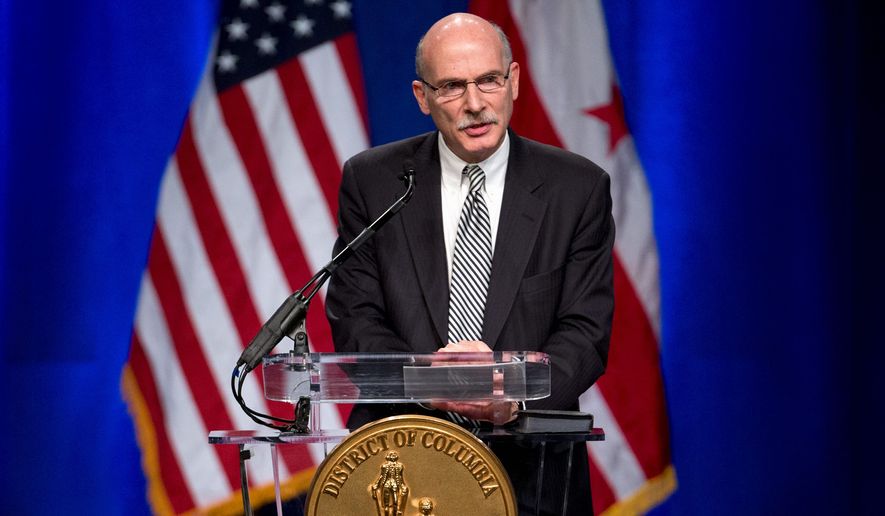D.C. business leaders are on board for paid family and medical leave, but have their own ideas on how to implement and fund it.
The D.C. Chamber of Commerce and other business groups have offered a counter proposal to the one making its way through the D.C. Council that would give employers more freedom in providing and paying for family leave.
“Everybody wants to do the right thing,” said Janene Jackson, who sits on the Chamber of Commerce’s Board of Directors. “The question is how we do it.”
The plan would compel businesses with more than 50 employees to offer at least eight weeks of paid family and medical leave with 100 percent salary reimbursement to employees. That’s the same amount city government workers currently get.
Employers would figure out how to pay for the leave plans individually. Ms. Jackson said that works out better for most large employers because they already offer paid leave.
The chamber’s proposal has been endorsed by the Consortium of Universities, the Apartment and Office Building Association, the D.C. Building Industry Association and the Hotel Association of Washington, D.C.
Under the latest draft of the paid leave bill, which is being reworked by council Chairman Phil Mendelson, workers across the District would get 12 weeks of paid family and medical leave. The leave, which would be the most generous such policy in the country, would be paid through a government fund created by a 1 percent payroll tax levied on businesses.
Ms. Jackson said the 1 percent tax is a major sticking point for city businesses, which operate at different profit margins and vary in their ability to pay an additional tax.
“The government right now is saying, ’You can afford another 1 percent payroll tax,’” she said. “We know our bottom line and [the chamber’s] proposal will allow us to give employees what they need.”
For businesses with 50 employees or fewer, the chamber’s proposal offers an insurance plan to fund eight weeks of paid leave.
“A lot of these small operators are not working with large profit margins,” Ms. Jackson said. “So we need to help small business.”
The chamber’s proposal calls for city officials to find an insurer to create a paid-leave policy for small businesses by using the $20 million that would have been set aside to launch the council’s plan.
Small business owners would be able to buy an income-replacement insurance policy and pay a monthly premium to cover their employees. The monthly premium would be partially subsidized by the city government, giving further relief to small businesses.
Advocates of paid leave say the chamber’s proposal would be a step in the right direction, but it’s not what they want.
“I’m heartened the way they were willing to come forward and engage in a fruitful discussion. It’s a good sign,” said council member David Grosso, at-large independent. “But I’m unable to put my support behind the proposal. I just didn’t see it as a viable alternative.”
Council member Elissa Silverman said the wage replacement insurance plan for small businesses would not be as efficient as one run by the city.
“We’re not farming it out completely to vendors,” said Ms. Silverman, at-large independent. “There are advantages to the government doing this work because we can do it a lot cheaper.”
Both Mr. Grosso and Ms. Silverman said the chamber’s plan lacks a mechanism for enforcement, which could lead to businesses skirting the law.
“Our most vulnerable workers are often reluctant to report violations because they are afraid of repercussions,” Ms. Silverman said.
Mr. Mendelson also pushed back against the proposal, saying it would benefit only large businesses.
“The employer mandate basically takes advantage of the fact that large companies offer disability insurance,” he said. “They can afford the insurance and therefore they provide it, so it would be no cost to them, but it leaves out the small businesses and that’s a problem.”
• Ryan M. McDermott can be reached at rmcdermott@washingtontimes.com.




Please read our comment policy before commenting.